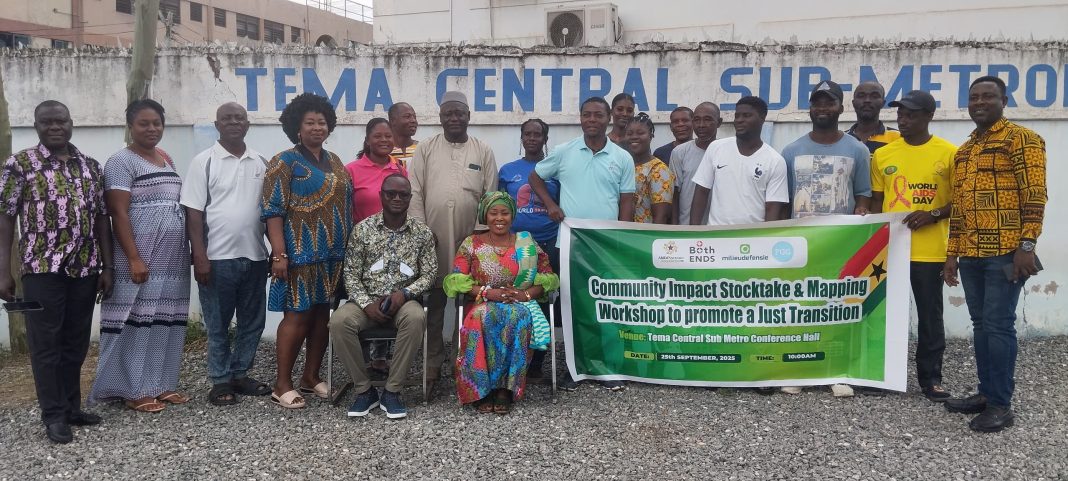Tema, Sept. 25,GNA-The AbibiNsroma Foundation, a climate change focused Civil Society Organisation(CSO), has embarked on a massive capacity building community engagement on Just Energy Transition in the Tema Metropolitan Area.
The group, led by its Comvenor, Mr Bob K. T. Amiteye, engaged with traditional rulers, Councilors, drivers and transport union members, and market women.
The rest are retired workers, teachers in coastal communities, Director of the Tema Central Sub Metro Council, Journalists and the Youth.
Speaking at the coastal community of Tema Manheam, where the whole coastal line has suffered sea erosion, he called for the official involvement of community leaders and members in the Ciimate Change and energy transition process.
He said Ghana’s current approach remains heavily centralized and investor-focused, sidelining traditional authorities and rural communities which held deep ecological knowledge and bore the greatest burden of energy poverty and climate vulnerability.
He told the pathetic story of a fish monger who after a night toil, woke up the next morning only to find out that all her smoked fish had been washed away by sea erosion.
In such circumstances, who does she go to for relief? He asked. “Obviously, the poor woman has to figure out a survival strategy all by herself after losing all her investment.”
Community-led energy governance structures offer a transformative solution. These institutions would allow for inclusive co-decision-making, ensure fair allocation of project benefits, and strengthen accountability through citizen-based monitoring and localised oversight, he said.
Expanding on the foundation’s policy on energy transition, he said Ghana’s just energy transition would remain incomplete without deliberate and institutionalised mechanisms for community engagement at the local level.
The foundation recommends that Ghana formally establish community-led energy governance structures as a central feature of its national energy transition strategy.
These bodies must reflect the legitimacy of traditional authorities—who hold jurisdiction over land and natural resources—and build upon their lived experience and contextual expertise.
” However, recognition alone is insufficient. Local authorities must also be equipped with technical capacity and embedded within national policy processes to co-govern energy systems from the outset. ” Mr Amiteye said.
To ensure that these structures are effective, they should be recognised under national law, endowed with regulatory and oversight responsibilities, and supported through a blend of public, donor, and private finance. They must not operate as temporary consultative forums but as statutory mechanisms with powers over planning, budget review, and dispute resolution.
These structures should also serve as local delivery arms for Ghana’s Nationally Determined Contributions (NDCs), helping translate national climate targets into place-based implementation strategies that reflect community needs and rights.
Ghana should establish Regional and District-Level Community Energy Committees with inclusive representation from traditional authorities, women’s associations, youth leaders, and cooperative groups.
These committees must hold formal co-decision-making powers on issues such as site selection, procurement terms, and community impact assessments for renewable energy projects.
Drawing in the experiences from Kenya’s Energy Sector Working Groups and Senegal’s Local Energy Committees, he said early-stage community involvement improved project acceptance, reduced implementation delays, and enhanced sustainability.
He explained that those bodies should serve as formal interlocutors with state and private actors and be embedded in statutory planning cycles.
We are also calling for the introduction of Community Benefit Trusts to create local financial structures that allocate a designated share of renewable energy project revenues to social infrastructure and development programmes, he said.
Transparent revenue management builds public trust and creates a material stake in energy infrastructure.
He said developing a Citizen Energy Audit Framework could also empower communities to track project compliance with environmental laws, labour standards, and equity commitments.
“This function is critical in areas where state enforcement remains weak. Drawing lessons from Peru’s Environmental Vigilance Committees and Ghana’s own Local Governance Act (Act 936), community monitors should be trained and supported by the Energy Commission and the Environmental Protection Authority(EPA). Such frameworks must be codified in national guidelines, with legal pathways for escalating violations and submitting compliance reports.”
The foundation bemoaned that fact that
customary ecological knowledge remained vastly underutilised in national energy planning.
Ghana has an opportunity to develop hybrid energy solutions by connecting traditional knowledge systems with modern technological innovation. Partnerships between technical universities, vocational training centres, and grassroots innovators can generate context-specific solutions such as solar-powered irrigation, wind pumps, and biomass conversion systems adapted to regional ecosystems,it said.
Ghana’s energy transition can set a precedent for equity, sustainability, and accountability in Africa—if it roots innovation in local institutions, not just infrastructure. Community-led energy management structures offer more than consultation; they provide a governance scaffold for just transition outcomes.
These structures can stabilize energy markets, enhance policy legitimacy, and deliver measurable development dividends.
“As international institutions, donors, and state actors invest in clean energy expansion, their frameworks must reflect the social architecture that sustains long-term equity. Supporting local governance in Ghana is not only good development practice—it is a strategic choice that aligns climate ambition with social cohesion.”Mr Amiteye said.
Some participants called for regular interaction and partnership with the CSO for constant information sharing which they could use as a tool for community sensitization and development.
GNA
25 Sept. 2025
Edited by Samuel Osei-Frempong
